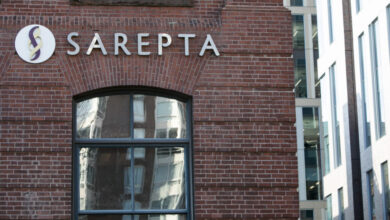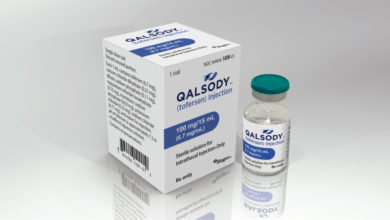ASCO Takeaways: Winners, snoozers, and the art of cancer care

You’re reading the web edition of ASCO in 30 Seconds, STAT’s guide to the American Society of Clinical Oncology annual meeting. We’ll resume for ASCO 2025.
Well, dear readers. Our ASCO reporting, including this newsletter, has come to the end. Read below for takeaway thoughts from Matt, Adam, and Angus.
Thank you for spending the past four days with us. We hope you learned a few things, and had some laughs, too.
One more pitch: Join us on Wednesday for our ASCO Recap virtual event, where we will try to put all this year’s ASCO news into perspective. You can register here.
Adam’s Take: Some hits, but relatively quiet
This was a big meeting for small hazard ratios. We’re talking “HRs” in the teens from targeted medicines made by AstraZeneca and Pfizer. For those not statistically inclined, that means long-term treatment benefits that reduce a patient’s risk of death or tumor progression by 80% or more. Phenomenal.
I spied a KRAS conundrum. Elegant science and decades of research finally cracked the undruggable cancer target, yielding two marketed drugs: Amgen’s Lumakras and Bristol Myers Squibb’s Krazati. But their benefits for patients with non-small cell lung cancer, where the mutation is most prevalent, are modest at best. Krazati showed a median tumor progression benefit of just 1.6 months over chemotherapy in a confirmatory study presented here. On a more encouraging note, there were early looks at data here on combination regimens and next-generation KRAS-targeting drugs that may yield better outcomes.
AstraZeneca is the Real Madrid of ASCO. Six plenary podiums in a row.
Daiichi Sankyo had its own mini-plenary with the presentation of the Enhertu DB-06 study in hormone receptor-positive, metastatic breast cancer, including a new category of “ultra low HER2” patients. “It’s not an overestimation to say that [Enhertu] is the most potent drug ever developed for breast cancer,” Paolo Tarantino, a medical oncologist at the Dana-Farber Cancer Institute, told me.
It was a relatively quiet meeting for biotechs. Most of the investors I met here mentioned Merus and Immunocore, but little else stood out. Summit Therapeutics was a sideshow.
Speaking of Merus, the company exploited an ASCO-sanctioned loophole that allows companies to report “final” data before the meeting even starts. There are some limitations, but essentially, the Merus ASCO suspense ended days before anyone even flew to Chicago. I’m not a fan of this approach, because it could be abused by less-than-ethical companies. Merus didn’t do that, thankfully. But c’mon people, if we’re presenting data “at ASCO,” let’s wait for ASCO.
I made it to Eleven City Diner for breakfast. Lox, eggs, and onions. The best.
— Adam Feuerstein
Matt’s Take: Fewer new ideas, more data from China
If we’re talking about this ASCO five years from now, it will probably be because of the CAR-T results in liver cancer from AstraZeneca and AbelZeta. Shrinking tumors in half of patients with a solid tumor is a big deal. We’ve been waiting for CAR-T to deliver there for a decade. But we do need more data, and that’s led, I think, to a muted reception.
Mostly, this wasn’t an ASCO for the record books — the field of oncology didn’t transform, the earth didn’t move, and I felt bleary the morning after. To use my usual measuring stick, there was no Gleevec, no PD-1 in melanoma, no first sighting of CAR-T.
Which is not to say there wasn’t plenty of innovation. Seeing Pfizer’s Lorbrena decrease lung cancer progression by 81% compared to Xalkori, one of the seminal drugs in medicine, was amazing. Watching AstraZeneca’s Tagrisso decrease progression in non-small cell lung cancer by 84% was neat. In both cases we are talking about people not having cancer spread to their brains!
But I am struck that even in AstraZeneca’s hat trick of studies, one was an EGFR inhibitor, a class of drugs Adam and I were writing about 20 years ago, and another was an immunotherapy (a PD-L1, the RC Cola to Keytruda’s Coke). Enhertu, the antibody-drug conjugate, was the newest thing, and it built on results we’d seen in previous years. A reminder, sure, that science is slow and methodical. But also a kick in the pants to get researchers to move these drugs to the earlier lines of treatment, when cancer has spread less, when there is a chance of really delaying disease. It’s a point the Food and Drug Administration’s Rick Pazdur made at STAT’s Friday evening event: Companies, you don’t have to wait so long to start these studies.
Another takeaway that goes back to Pazdur: We really need to think hard about China. A lot of data is coming from there. That CAR-T study started there because it was taking a long time to start it in the U.S. The biggest stock gainer was Summit Therapeutics, backed by billionaire Bob Duggan, who sold Pharmacyclics to AbbVie. Its vaporware press release was, again, based on data from China. The FDA’s current stance is that even if cancer were cured on the other side of the world, U.S. studies will be needed. That’s fine if we’re just talking about another PD-1 drug in the same class as Keytruda and Opdivo. But at some point the decisions may get tougher.
Every year the ASCO meeting seems more about drugs made by large pharmaceutical companies and less about dramatic stories about little biotech companies. It was true this year. But often those world’s overlap, and if you are looking for some drama, I’ll point you to Adam’s story about Novartis and MorphoSys. Ouch.
Finally, a departing salute to my favorite Chicago bands: Smashing Pumpkins, Earth, Wind & Fire, Rise Against, and Wilco.
See you next year.
—Matthew Herper
Angus’ Take: A welcome spotlight on comfort
I agree with Matt in the sense that there weren’t too many mind-blowing results. But this was a good ASCO for improving patient well-being. One of the plenaries this year was a randomized trial on how to better deliver palliative care, a topic that might typically have been sidelined.
“It’s very unusual to have palliative care highlighted in a plenary,” said Elizabeth Loggers, an oncologist and palliative care specialist at the Fred Hutchinson Cancer Center. Also prominent at ASCO this year was a quality improvement study on an AI patient navigation program, a presentation that emphasized cancer early detection and prevention and the need for equitable access to that care.
Along the same lines of improving patient well-being, I heard a lot of chatter about finding better ways to scale back treatments when possible — one of the core tenets in oncology. Cancer doctors and researchers are always interested in figuring out which patients probably could go with less intensive treatment. I heard over and over about the ability of ctDNA to help distinguish which patients might need more treatment, like in the adjuvant setting, and which ones are probably safe without continuing it. Wonderful. Chemotherapy sucks, and other treatments often do too.
In particular, this ASCO had five-year data on using ctDNA to guide adjuvant therapy in stage 2 colorectal cancer from the DYNAMIC trial, and I saw signs that this approach is moving towards lung cancer as well in data from the biotech Foresight Diagnostics.
There’s also some suspense for the future of CAR-T. For so long, the CAR-T field has been trying, in vain, to crack the solid tumor egg. This ASCO had a very interesting Phase 1 study from (continuing ASCO crown-winner, agreed) AstraZeneca and its partners at AbelZeta and Zhejiang University School of Medicine.
In the dose escalation trial, their CAR-T for advanced liver cancer had an overall response rate of over 50% and a response rate of 75% in the highest dose level. With ongoing responses and a reasonable safety profile, I’m definitely looking forward to seeing how the Phase 2 trial turns out. AstraZeneca is recruiting for it now.
This CAR had an interesting target in the oncofetal protein GPC3, and it also was armored against the immunosuppressive cytokine TGF-beta. If success is seen in the Phase 2, it could mean there’s a future in solid tumors with these next generation CAR-Ts that include armoring or other strategies.
With a heat wave coming to California, I do wish I was staying in the fair summer weather of this great city just a little bit longer. Alas, until next time, Chicago.
— Angus Chen
Could a STAT event with Rick Pazdur fill this place?
Goals.



